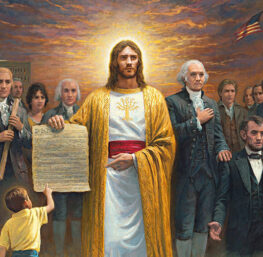American Thinker | by Andrew Foy and Brenton Stransky | Oct. 31, 2009
The Founding Founders established a Republic under a written Constitution with the clear intent of protecting individual freedom; however, the role of our government has been grossly perverted over the last century to the point where politicians now violate individual rights routinely and without batting an eye. Most violations occur under the banner of providing for the public good, and to garner support, call upon the virtues of charity and sacrifice. Fortunately, charity and sacrifice in a free society are individual and personal undertakings and as a rule, cannot be subject to coercion if liberty is to be maintained. The current President and various members of both political parties do not abide by this rule and as such are positioning themselves as tyrants; servitude will be the price we pay unless we stand up today and defend our rights boldly and educate the broader public on the proper role of charity and sacrifice in a free society.
In his authoritative work on freedom, The Constitution of Liberty1, F.A. Hayek explained the role charity plays in a free society:
By common opinion our chief concern…[is] the welfare of our family. But we also show our appreciation and approval of others by making them our friends and their aims ours. To choose our associates and generally those whose needs we make our concern is an essential part of freedom and of the moral conceptions of a free society. General altruism, however, is a meaningless conception. Nobody can effectively care for other people as such; the responsibilities we can assume must always be particular, can concern only those about whom we know concrete facts and to whom either choice or special conditions have attached us. It is one of the fundamental rights and duties of a free man to decide what and whose needs appear to him most important.
Ayn Rand was less loquacious in her explanation, “only individual men have the right to decide when or whether they wish to help others; society – as an organized political system – has no rights in the matter at all.”2
Now ask yourself, regarding how your tax money is collected and spent for public services – do you get to decide what and whose needs appear most important to you or do politicians? It’s a rhetorical question but emphasizes an important point – that when politicians position themselves as the purveyors of charity, the values with respect to each member of society are disregarded as the values of one group or special interest win over those of others.
The Constitution and Bill of Rights, by limiting the power of the state, specifically forbade political charity in the interest of protecting the individual against mob rule and tyranny but these documents have been tossed aside by today’s political elite. According to Hayek, “a society that does not recognize that each individual has values of his own which he is entitled to follow can have no respect for the dignity of the individual and cannot really know freedom.”
As a reminder, the rights that our Founders sought to protect from government in order to ensure individual freedom were the unalienable or natural rights of man to life, liberty, property, and the pursuit of happiness. These are rights to action and as such impose no obligation on an individual except to abstain from violating the rights of another individual.
Now back to charity and sacrifice in a free society, let’s consider the question of publically supported health insurance. Does the fact that some individuals cannot or do not provide health insurance for themselves and family place a sanction on other individuals to provide it, whom the government has deemed make enough. Forgetting that the concept of make enough is completely arbitrary – publically supported health insurance does not respect the values and ambitions of those members of society who would not freely donate the money being taken from them in taxes to support that particular cause.
Those individuals may instead choose to keep that money and buy a flat screen television, put it toward financing their own business venture, use it to send their child to baseball camp or piano lessons or a thousand other possibilities. Even if you are not inclined to agree that those individuals are putting their money to the best use you must respect their freedom to pursue their ambitions and values so long as they do not infringe on the equally protected sphere of others. For if these same individuals were robbed on the street in the name of using the money to donate to health insurance, you would certainly consider the perpetrators thieves.
The above example clearly illustrates why Ayn Rand considered government the biggest threat to individual rights, “it holds a legal monopoly on the use of physical force against legally disarmed victims. When unlimited and unrestricted by individual rights, a government is men’s deadliest enemy.”2 It matters not whether its intentions are charitable.
Many individuals will still ask, “What of the poor and those who can’t provide certain necessities for themselves?” The answer in a free society is clear: you will not be stopped from helping them and therein lies the essence of charity. According to Rand:
If a man speculates on what “society” should do for the poor, he accepts thereby the collectivist premise that men’s lives belong to society and that he, as a member of society, has the right to dispose of them…that psychological confession reveals the enormity of the extent to which altruism erodes men’s capacity to grasp the concept of rights or the value of an individual life.
If history teaches us one thing, it is to be on guard to protect our freedom from men who believe they have the right to provide charity and dispose of the private property of individuals in the name of the public good (see Hitler, Mussolini, Stalin, Lenin, Mao or Castro). It was Alexander Hamilton who wrote:
Of those men who have overturned the liberties of republics, the greatest number has begun their career by paying an obsequious court to the people, commencing demagogues and ending tyrants.
To protect freedom from the grasp of these individuals Rand shared the following advice:
The next time you encounter one of those “public-spirited” dreamers who tells you rancorously that “some very desirable goals cannot be achieved without everybody’s participation,” tell him that if he cannot obtain everybody’s voluntary participation, his goals had better remain unachieved – and that men’s lives are not his to dispose of.
. . . more



